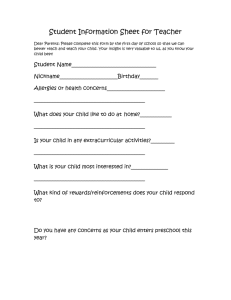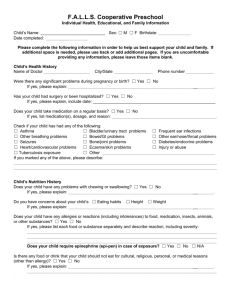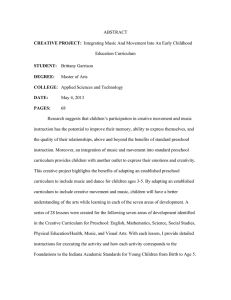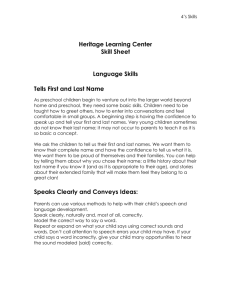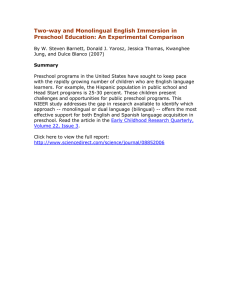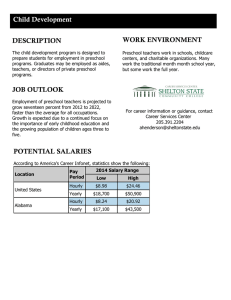Chesak Elementary, DOOR 4 10910 Reed Road LITH, IL 60156
advertisement
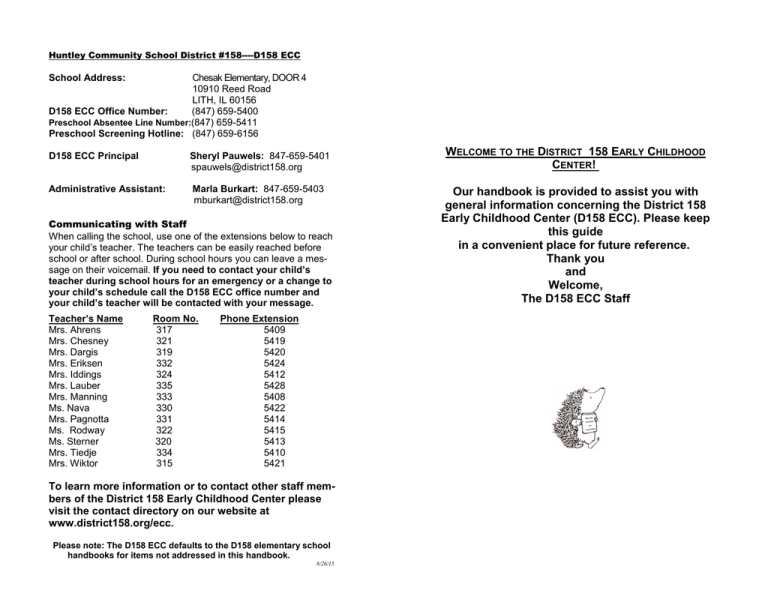
Huntley Community School District #158----D158 ECC School Address: Chesak Elementary, DOOR 4 10910 Reed Road LITH, IL 60156 D158 ECC Office Number: (847) 659-5400 Preschool Absentee Line Number:(847) 659-5411 Preschool Screening Hotline: (847) 659-6156 D158 ECC Principal Sheryl Pauwels: 847-659-5401 spauwels@district158.org Administrative Assistant: Marla Burkart: 847-659-5403 mburkart@district158.org Communicating with Staff When calling the school, use one of the extensions below to reach your child’s teacher. The teachers can be easily reached before school or after school. During school hours you can leave a message on their voicemail. If you need to contact your child’s teacher during school hours for an emergency or a change to your child’s schedule call the D158 ECC office number and your child’s teacher will be contacted with your message. Teacher’s Name Mrs. Ahrens Mrs. Chesney Mrs. Dargis Mrs. Eriksen Mrs. Iddings Mrs. Lauber Mrs. Manning Ms. Nava Mrs. Pagnotta Ms. Rodway Ms. Sterner Mrs. Tiedje Mrs. Wiktor Room No. 317 321 319 332 324 335 333 330 331 322 320 334 315 Phone Extension 5409 5419 5420 5424 5412 5428 5408 5422 5414 5415 5413 5410 5421 To learn more information or to contact other staff members of the District 158 Early Childhood Center please visit the contact directory on our website at www.district158.org/ecc. Please note: The D158 ECC defaults to the D158 elementary school handbooks for items not addressed in this handbook. 8/26/15 WELCOME TO THE DISTRICT 158 EARLY CHILDHOOD CENTER! Our handbook is provided to assist you with general information concerning the District 158 Early Childhood Center (D158 ECC). Please keep this guide in a convenient place for future reference. Thank you and Welcome, The D158 ECC Staff Purpose Statement The purpose of the District 158 Early Childhood Center (D158 ECC) is to create an educational experience that will provide the foundation for learning by addressing the unique developmental needs of children through experiences and interactions with peers and adults. Enrollment All children must meet eligibility criteria to be eligible for enrollment in the preschool program. Children are eligible because they have been evaluated by the preschool team and together with parents and have either an identified disability or have risk factors that may cause difficulty later in school. All children must be enrolled with a copy of their birth certificate and must have a current physical with an immunization record completed within the last 12 months for entry into school. Program Design The District 158 Early Childhood Center is designed to meet the criteria set by the Preschool for All Children Illinois State Grant Program and also meets the needs of students that have qualified for an Individualized Education Program (IEP) under IDEA. The preschool program has classrooms for students that have qualified as at-risk under Preschool for All Children, Early Childhood Special Education classes and classes that blend the students identified as at-risk and students with an IEP. Related services such as social work, speech and language, occupational therapy, physical therapy, hearing and vision support, orientation and mobility are available for students who qualify for the service. These services are integrated into the classroom setting whenever possible. Some of these services may be provided by removing the students from the classroom or through out-patient services when appropriate. All program placements are determined by the school team with the parent/guardian and follow the Illinois State Board of Education (ISBE) procedures and requirements. Please visit www.isbe.net for more information. Classroom programs operate 5 days a week for 2.5 hours in either a morning or an afternoon session. Snack is provided in the Preschool for All Children classes and ECSE classes. Curriculum The Creative Curriculum model is implemented and aligned with the Illinois Early Learning Standards. Four developmental areas are addressed: social/emotional, physical, cognitive, and language. These areas of development are most effectively taught when children are engaged in activities with their peers, adults, and in natural environments. Toilet Training / Bathroom Procedures Several children who are attending our Preschool Program are in various stages of toilet training. If toilet training is being worked on at home we will try to accommodate your child by using the same strategies at school. If toilet training is not being addressed at home we will assist your child as needed when parent provided pull-ups or diapers are soiled or she/he indicates a need to be changed. Your child’s teacher may provide toilet training suggestions and / or information upon request. Reminders: • Please be sure that your child attempts to go to the bathroom and has a clean, dry pull-up before he/she comes to school or gets on the bus. • The goal is to develop independence in self-help skills. All children will be encouraged to do as much as possible by themselves. Staff will offer help as needed. Preschool Safety In the Classroom: • Sharp objects and cleaning supplies are kept in cabinets and out of reach for young children. • Toys and materials are inspected frequently for broken pieces. In the Hallway: • An adult is always present when children need to walk in the hallway or go to the bathroom. • All District # 158 school employees are required to wear ID badges. Visitors must sign in at the front office and wear a visitors tag. Any adults in the hallway will be asked to give a reason for being there and requested to show a picture ID. • Even if a teacher is expecting a parent to visit a classroom, the parent MUST still sign in at the main office, obtain a visitor's pass and wait to be directed to the classroom. On the Playground: • Our playground is fenced in for the safety of our students. • There will always be at least a teacher and an assistant with the children on the playground. Frequently two classes will use the playground at the same time and then there will be additional staff to supervise the children. • We will remind all children about the rules for the playground prior to going outside and there will be appropriate consequences for anyone who does not follow the rules. • Teachers will use a variety of strategies as needed to keep the children safe walking to and from the school building. Please contact your child’s teacher if you have questions. Social/Emotional Development The District 158 Early Childhood Center is a proud participant of the Illinois PBIS (Positive Behavior Interventions and Supports) Network. Please visit www.pbisillinois.org to learn more. Socialization is an essential part in learning. All young children need to develop a sense of security and safety in the classroom environment as well as respect for themselves and others. Through positive interactions in a caring atmosphere the following strategies will be utilized: • • • • • • Demonstrate / model positive interactions State classroom rules frequently, often using pictures to lustrate Set limits and consequences Give choices whenever possible Redirect children to appropriate and positive activities Use consistent strategies il- If a situation arises in which interaction by an adult is necessary to maintain an ongoing safe / secure environment, the following consequences may occur: • • • • • Reminder of appropriate behavior Use consistent strategies Redirection to another activity Time away from an activity and/or peers within the classroom Removal of a child from the classroom for safety reasons All strategies are based on individual needs of the child and the learning situation. For students with a Behavioral Intervention Plan, behaviors will be addressed as outlined in their plans. Dressing for School Since we do many activities that can be messy or that require the children to participate on the floor, we suggest the children wear washable “play” clothing. As the weather changes and the children are wearing more clothes, we strongly encourage them to dress and undress themselves. Parents can help by teaching children to put on and remove outer clothing. The more practice children have the better they can accomplish these tasks independently. Please put their name inside their clothing and backpacks. It is best that students wear gym shoes since we do have gross motor time every day either inside or outside, weather permitting Assessment Preschool has adopted Teaching Strategies Gold Assessment system. All children are monitored for progress in social/emotional, physical, language, cognitive, literacy and mathematic skills. Progress is reported to parents three times per year. Additional assessments may be used to monitor progress. Parent Partnership: A partnership with the parents of all preschool children is integral to the success of the program. One Friday per month parent education sessions are held where parents and preschool staff explore topics to enhance the development of our preschool children. Additional family activities are regularly scheduled throughout the year on parent education days, in the evenings and on Saturdays. Parent Notifications and Permissions: There will be times throughout the year when parents are asked to give permission for activities or indicate attendance at such activities as field trips, family activities, and parent education sessions. Parents are respectfully asked to indicate participation at the time responses are due. We do not want to disappoint parents and children when late responses are received and arrangements for activities have been made and cannot be changed. Thank you! Home/School Communication What you can expect: • Parent /Teacher Conferences are conducted twice a year in the Fall and Spring either by phone or in person. • Written progress reports, three times per year • Classroom Newsletters and Calendars • Notification for upcoming D158 Early Childhood Center events. • Parents may communicate with staff through e-mail, phone calls or notes. Please allow time for the staff to respond, as all communication will be done during non-student attendance times, as to not interfere with direct instruction. • Monthly parent education sessions at D158 ECC generally held the 3rd Friday of the month. See the district calendar for specific dates. • Please visit our website at www.district158.org/ecc Attendance Attendance is crucial for participating students to succeed. If a student is absent or tardy more than 12 days per semester parents will be contacted to discuss attendance. If attendance does not improve by the end of the following semester a child’s participation in the at-risk program may be discontinued. Attendance Class Times for Preschool Session 1 Monday---Friday 7:45-10:15 a.m. Session 2 Monday---Friday 10:45 a.m.-1:15 p.m. SNAP Program Monday-Friday 7:45 a.m.-1:15 p.m. Out-Patient Speech Scheduled as needed Absentee Line, Illness, and Health Policy Absence If your child is going to miss a day of preschool the absentee line must be called to let the school know that your child will not be attending school. The absentee phone number is 847-659-5411. Illness When your child has symptoms of an illness or a fever of 99.6 or higher, please do not send your child to school. School policy is to wait until the temperature has been normal for 24 hours before he/she returns to school. If a child becomes ill at school, the child’s parent/guardian will be notified to pick up the child immediately. Be sure to have alternate emergency numbers of friends and relatives listed. Medication Every attempt should be made to schedule medication administration outside of school hours. However, if under exceptional circumstances a child is required to take prescribed oral medication during school hours, the school nurse or their designee will administer the medication in compliance with the following regulations: Prescription Medication: • Written instructions signed by the parent or guardian. • The original prescription bottle must be brought to school by the parent (Children must NOT carry the medication to school.) • The prescription bottle label must contain the child’s name, name of the medication, purpose of medication, time to be administered, dosage, possible side effects and termination date of administering the medication. Non-Prescription Medication • Written instruction signed by the parent or guardian. • Written instructions signed by the medical doctor. Medication (cont.) Non-Prescription Medication • Non-prescription medication will need to be provided and brought to school by the parent. (All medication must be labeled with the child’s name. Children must NOT carry the medication to school.) Vision & Hearing Vision and hearing screening is done as mandated for preschool children. Parents will be notified of the screening days annually. Vision screening is not a substitute for a complete eye and vision evaluation by an eye doctor. Children are not required to undergo this vision screening if an optometrist or ophthalmologist has completed and signed a report form indicating an eye exam has been administered within the previous 12 months and that evaluation is on file at the school. Vision and hearing screenings are not an option. If a vision or hearing examination report is not on file at the school for your child, we are required to conduct the screening. Daily Schedule A daily schedule and routine provide a basic consistent structure for each day to meet children’s individual needs and enhance the development of each child. A good schedule for children of preschool age offers balance between active and quiet times; large group, small group and individual activities; indoor and outdoor play times; and times for children to choose their own activities as well as times for teacher – directed activities. A daily schedule works best when it is also developmentally appropriate, flexible and at times spontaneous to meet individual and group interests. Our preschool schedule includes the following components not necessarily in this sequence in every classroom. Typical Daily Schedule • Arrival time • Whole group or circle time • Snack as a whole group or during choice time • Choice time includes free play in interest areas, small groups and/or individual assistance, snack may be included • Gross motor activities outside on the playground or inside in the multipurpose room/classroom • Story time / music / finger plays • Arts & craft activities • Cooking (occasionally) • Group time & get ready to go home Bathroom times are scheduled as needed for toileting and hand washing.


